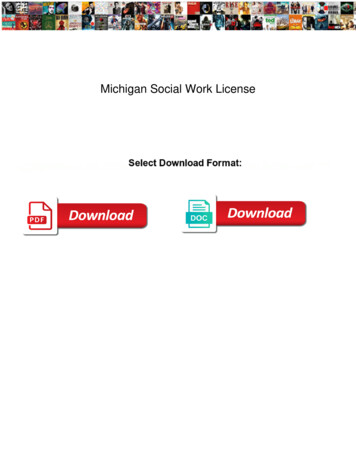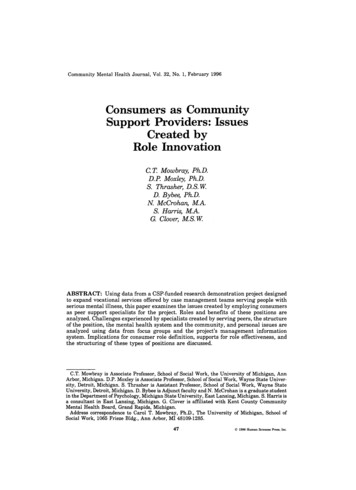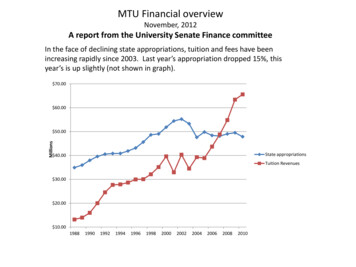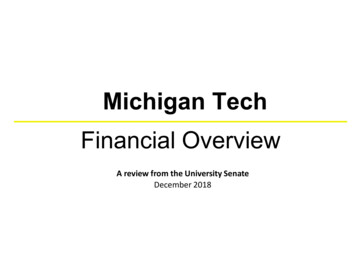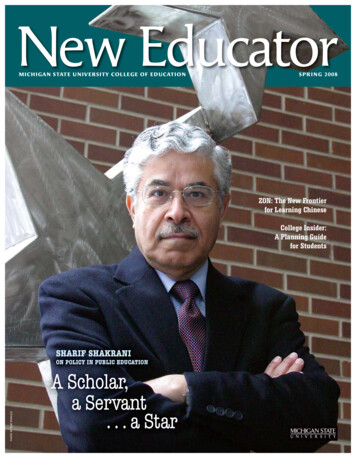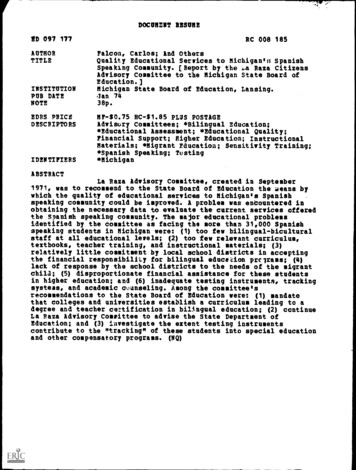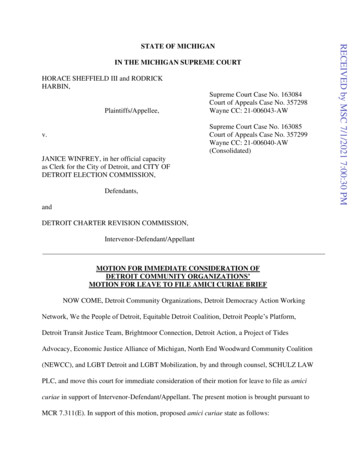
Transcription
IN THE MICHIGAN SUPREME COURTHORACE SHEFFIELD III and RODRICKHARBIN,Plaintiffs/Appellee,Supreme Court Case No. 163084Court of Appeals Case No. 357298Wayne CC: 21-006043-AWSupreme Court Case No. 163085Court of Appeals Case No. 357299Wayne CC: 21-006040-AW(Consolidated)v.JANICE WINFREY, in her official capacityas Clerk for the City of Detroit, and CITY OFDETROIT ELECTION COMMISSION,Defendants,andDETROIT CHARTER REVISION COMMISSION,Intervenor-Defendant/AppellantMOTION FOR IMMEDIATE CONSIDERATION OFDETROIT COMMUNITY ORGANIZATIONS’MOTION FOR LEAVE TO FILE AMICI CURIAE BRIEFNOW COME, Detroit Community Organizations, Detroit Democracy Action WorkingNetwork, We the People of Detroit, Equitable Detroit Coalition, Detroit People’s Platform,Detroit Transit Justice Team, Brightmoor Connection, Detroit Action, a Project of TidesAdvocacy, Economic Justice Alliance of Michigan, North End Woodward Community Coalition(NEWCC), and LGBT Detroit and LGBT Mobilization, by and through counsel, SCHULZ LAWPLC, and move this court for immediate consideration of their motion for leave to file as amicicuriae in support of Intervenor-Defendant/Appellant. The present motion is brought pursuant toMCR 7.311(E). In support of this motion, proposed amici curiae state as follows:RECEIVED by MSC 7/1/2021 7:00:30 PMSTATE OF MICHIGAN
promote voter education and civic engagement.2. We the People of Detroit is a Detroit based organization focused on research, advocacyand organizing to secure a water affordability policy for Detroiters and provides water tofamilies experiencing water shutoffs.3. Equitable Detroit Coalition is a Detroit citywide coalition organized to promote equitabledevelopment policies for publicly subsidized large-scale private development projects.4. Detroit People’s Platform is a Detroit citywide organizing and advocacy organizationfocused on improving quality of life for Detroiters.5. Detroit Transit Justice Team is a Detroit organizing group led by essential bus riders whoadvocate for quality and affordable public transit with Detroit public transit department.6. Brightmoor Connection is a volunteer led service organization serving Detroiters in the48223 community providing emergency food, water, and service referrals to 1700 lowincome households.7. Detroit Action, a Project of Tides Advocacy, is a member led organizing and advocacygroup focused on improving quality of life for low income Detroiters.8. Economic Justice Alliance of Michigan is an alliance of organizations focused ondeveloping effective leadership of low to moderate income residents in Detroit andstatewide to promote improved economic outcomes.9. North End Woodward Community Coalition (NEWCC) is a Detroit based organizationproviding community broad band access to low income households in selectedneighborhoods in Detroit.RECEIVED by MSC 7/1/2021 7:00:30 PM1. Detroit Democracy Action Working Network is a Detroit based collaborative working to
concerns of LGBT in the city and across the region in the fight for human dignity.11. On June 3, 2021, the Court of Appeals expedited consideration of the issues in this caseand issued an opinion upholding the decision of the Wayne County Circuit Court, fromwhich the Intervenor-Defendant/Appellants has sought leave to appeal from thisHonorable Court.12. On June 3, 2021, the Intervenor-Defendant/Appellants filed an application for leave toappeal and related motions to expedite consideration by this Honorable Court.13. With this motion, the moving parties have filed their motion for leave to file an amicicuriae brief in support of the Intervenor-Defendant/Appellant.14. The present motion is brought pursuant to MCR 7.311(E) and the inherent powers of thisHonorable Court.15. The moving parties jointly request immediate consideration of their motion for leave tofile an amici curiae brief.16. Immediate consideration is necessary to due to the exigencies of the voting rights at issuein the present case and the request for expedited consideration by this Honorable Court.17. The pending matter is of grave public importance and has generated wide public interestand implicates citizens’ right to vote on the governing documents of the city in whichthey live.18. As more fully stated in their motion for leave to file, the proposed amici curiae (attachedas Exhibit A) are organizations involved with and advocating for Detroit residents acrossthe city and were active in the public charter revision process. They bring a powerfulperspective on the issues presented, will not duplicate the briefing of the parties, and willRECEIVED by MSC 7/1/2021 7:00:30 PM10. LGBT Detroit and LGBT Mobilization is a community organization that advances the
fundamentally alter amici’s democratic rights.WHEREFORE, proposed amici curiae respectfully pray that the Court give immediateconsideration to their motion for leave to file an amici curiae brief and grant leave for theirappearance and the filing of an amici curiae brief in this case.Respectfully submitted,By: /s/ Jack W. SchulzJack W. Schulz (P78078)SCHULZ LAW PLCPO Box 44855Detroit, MI 48244(313) 246-3590jackwschulz@gmail.comDATE: July 1, 2021RECEIVED by MSC 7/1/2021 7:00:30 PMprovide important insight to the Court as it weighs issues that have the possibility to
HORACE SHEFFIELD III and RODRICKHARBIN,Supreme Court Case No. 163084Court of Appeals Case No. 357298Wayne CC: 21-006043-AWPlaintiffs/Appellee,Supreme Court Case No. 163085Court of Appeals Case No. 357299Wayne CC: 21-006040-AW(Consolidated)v.JANICE WINFREY, in her official capacityas Clerk for the City of Detroit, and CITY OFDETROIT ELECTION COMMISSION,Defendants,andDETROIT CHARTER REVISION E OF SERVICEI hereby certify that on July 1, 2021, I electronically filed the foregoing paper with theClerk of the Court using the Courts electronic filing system which will send notification of suchfiling to all counsel.Respectfully submitted,By: /s/ Jack W. SchulzJack W. Schulz (P78078)SCHULZ LAW PLCPO Box 44855Detroit, MI 48244(313) 246-3590jackwschulz@gmail.comRECEIVED by MSC 7/1/2021 7:00:30 PMSTATE OF MICHIGANIN THE MICHIGAN SUPREME COURT
(Proposed Amici Curaie Brief)RECEIVED by MSC 7/1/2021 7:00:30 PMExhibit A
IN THE MICHIGAN SUPREME COURTHORACE SHEFFIELD III and RODRICKHARBIN,Plaintiffs/Appellee,Supreme Court Case No. 163084Court of Appeals Case No. 357298Wayne CC: 21-006043-AWSupreme Court Case No. 163085Court of Appeals Case No. 357299Wayne CC: 21-006040-AW(Consolidated)v.JANICE WINFREY, in her official capacityas Clerk for the City of Detroit, and CITY OFDETROIT ELECTION COMMISSION,Defendants,andDETROIT CHARTER REVISION COMMISSION,Intervenor-Defendant/AppellantAMICI CURAIE BRIEF OF THE DETROIT COMMUNITY ORGANIZATIONS INSUPPORT OF INTERVENOR DETROIT CHARTER REVISION COMMISSION’SEMERGENCY APPLICATION FOR LEAVE TO APPEALRECEIVED by MSC 7/1/2021 7:00:30 PMSTATE OF MICHIGAN
TABLE OF CONTENTS .iiTABLE OF CITED AUTHORITIES .iiiINTEREST OF AMICI CURIAE .1SUMMARY OF ARGUMENT .1ARGUMENT .3A. The History of Michigan’s Constitutional Amendments ProgressivelyStrengthen Home Rule Provisions .3B. The Lower Courts Misconstrued General Laws Governing the Revision of aLocal Charter .7C. The Legislature Can Pass General Laws Regarding the Incorporation ofCities, Elections, and Amending Charters, but It Cannot Enact a GeneralLaw that Substantively Abrogates that Right .12D. Appellees Argument is a Pretext for Political Maneuver .13CONCLUSION .14iiRECEIVED by MSC 7/1/2021 7:00:30 PMTABLE OF CONTENTS
MICHIGAN SUPREME COURTAttorney Gen ex rel Lawrence v. Trombly, 89 Mich (1891) .5Attorney General v. Lacy, 180 Mich 329 (1914) .5Hazel Park v Muni Fin Com, 317 Mich 582 (1947) .6Marxer v Saginaw, 270 Mich 256 (1935) .5, 6People ex rel. Le Roy v. Hurlbut, 24 Mich 44 (1871) .4Streat v Vermilya, 268 Mich 1 (1934) .6OTHER CASESCity of Clinton v. Cedar Rapids & M.R.R. Co., 24 Iowa 455, 475 (1868) .3CONSTITUTIONAL PROVISIONSConst 1963, art 7, § 21 .12Const 1963, art 7, § 22 .12Const 1963, art 7, § 34 .12Const 1908, art 8, § 21 .5STATUTESMCL 117.18, 22 (1909) .7MCL 117.18, 22 (1913) .8, 9MCL 117.18, 21-22 (1963) .7OTHER AUTHORITIES4/30/2021 Governor Review with Attorney General Analysis, Intervenor DetroitCharter Revision Commission's Emergency Application for Leave To Appeal And ToBypass The Court Of Appeals, Vol 3 App p. 375 .122018 Detroit Charter Revision Commission, available at ome?authuser 0 (accessed June 28, 2021).1Detroit Future City’s Center for Equity, Engagement, and Research, The State ofEconomic Equity in Detroit (May 2021), available at 21/05/The-State-of-Economic-Equity-in-Detroit.pdf/ .2Michigan Municipal League, Home Rule in Michigan- Then and Now (July 2006),available at -paper.pdf .1, 2Ray, Morgan, Wiledon, Elizondo, and Wiley-Yancy, Examining and AddressingCOVID-19 Racial Disparities in Detroit (Mar. 2, 2021), available at ddressing-covid-19racial-disparities-in-detroit/ .3iiiRECEIVED by MSC 7/1/2021 7:00:30 PMTABLE OF AUTHORITIES
ivRECEIVED by MSC 7/1/2021 7:00:30 PMUnited States Census Bureau, QuickFacts: Detroit City, Michigan, availableat itcitymichigan,MI/PST045219 .2
Amici curiae are Detroit residents and nonprofit organizations who participated in the DetroitCharter Revision Commission citizen participation process and whose right to vote on theircommunity’s charter would be diminished if the lower court’s ruling is upheld.INTRODUCTION: MICHIGAN HAS ALWAYS PROVIDED HOME RULE AS AMEANS FOR COMMUNITIES TO ADAPT TO SOCIAL CHALLENGESOn the surface, Appellees request that this honorable Court enforce a "cut off time" forpolitical actors (i.e., The Governor and the Detroit Charter Revision Commission) to be aligned inview concerning the Charter. This argument is based solely upon the unsupported assertion thatthe voters will not "understand" what they are voting on. The charter proposal is the culminationof two years of public process, which included twice-monthly Committee of the Whole meetingsthat were attended by hundreds of Detroiters and local organizations.1In actuality, beneath the pious language of the appellee's argument is the real impact of thiscontroversy, the dilemma on whether to affirm or deny the status of Michigan as a strong "HomeRule" state. Michigan citizens’ adoption of strong home rule provisions in the state constitutionarose amidst a large wave of poor and rural immigrants coming to Michigan in search of a moresecure economic future for themselves provided by the great boom in factory jobs at end of the19th and beginning of the 20th century.The modern concept of "home rule" can be traced to the 19th centuryand the great waves of people that migrated from rural areas to citieslooking for jobs during the industrial revolution. This migrationbrought with it explosive growth and the need for many newservices. As communities struggled for the best mechanisms bywhich to provide services in an efficient and effective manner, theyfound a model in the corporate world and its structure for success.1Full agendas and meeting minutes for both committee of the whole meetings and subcommittee meetings can befound on the Detroit Charter Revision Commission website. 2018 Detroit Charter Revision Commission, availableat ome?authuser 0 (accessed June 28, 2021).1RECEIVED by MSC 7/1/2021 7:00:30 PMINTEREST OF AMICI CURIAE
Citizens’ adoption of strong home rule provision in the 1908 constitution arose against abackground of Michigan jurisprudence recognizing the Cooley doctrine as a direct limitation onDillon’s Rule in this state. Under the Cooley doctrine, Michigan’s leading jurist found inherentlimitsDetroit residents are now at a similar apex in history. Against the backdrop of poverty,joblessness, housing crisis, disparate mortality, and the devastation of the COVID-19 crisis, Morethan a third of Detroit’s residents are living in poverty with a median income of 29,481 in Detroit,compared with 54,938 for the state3. In Detroit, only 17% of residents have a bachelor’s degreeor higher. 17% of Detroit’s third graders are proficient in English language arts, compared to 43%across the region.4 Detroit’s labor force participation is the lowest in the top 100 US cities bypopulation.5 Only 5% of 59% Detroit’s residents live in a middle-class neighborhood, comparedto in the region6. Finally, and very disturbingly, the state of Michigan has the fourth highestMichigan Municipal League, Home Rule In Michigan – Then and Now, (July 2006), p 1, available at -paper.pdf .3United States Census Bureau, QuickFacts: Detroit city, Michigan, itcitymichigan,MI/PST045219 .4Detroit Future City’s Center for Equity, Engagement, and Research, The State of Economic Equity in Detroit (May2021), p 75 available at 021/05/The-State-of-Economic-Equityin-Detroit.pdf/ .5Id. at 46.6Id. at 93.22RECEIVED by MSC 7/1/2021 7:00:30 PMThere, rules of operation were set forth in the corporation's bylaws(charter), a document that was approved by the stockholders(qualified voters) and which could be tailored to meet an individualcommunity's needs. The key was to develop a form of governmentthat could best provide those services. During the late 1800'sMichigan made use of the "special act" system of writing citycharters. This meant the Legislature had to adopt local or specialacts for each community. This was cumbersome and inefficient tosay the least. In 1907, more than 400 such acts were written! Finallythrough adoption of the 1908 constitution, Michigan became theeighth state to set forth the principles of home rule.2
living in Michigan can expect to die from COVID-19. Wayne County has been most impacted bythe virus. 8In Detroit, Black people represent over 75 percent of known COVID-19 diagnoses byrace and nearly 90 percent of deaths.9 These are not simply stunning statistics: these numbers andpercentages describe reality for Detroiters. The proposed charter revisions provides a frameworkto address these significant challenges.There is no legal dispute that Michigan’s constitution grants local electors the right draftand vote on their city charter. Detroiters find themselves searching for ways to accommodate andsearch for modern, progressive means of providing services and meeting the needs of the citizenry.Like the pioneers of the 1908 Constitutional Convention, today's citizens want, need, and have aright to vote a charter tailored to meet the needs of modern governance challenges.II.ARGUMENT1. The History of Michigan's Constitutional Amendments ProgressivelyStrengthen Home Rule ProvisionsIn 1868, Iowa Supreme Court Justice John F. Dillon narrowly interpreted a localgovernment's authority as only being able to engage in an activity if the state governmentspecifically sanctions it. This doctrine became known as "Dillon's Rule." According to Dillon,municipal corporations owe their origin to, and derive their powers and rights wholly from, thelegislature. It breathes into them the breath of life, without which they cannot exist. As it creates,so may it destroy. If it may destroy, it may abridge and control. City of Clinton v. Cedar Rapids &M.R.R. Co., 24 Iowa 455, 475 (1868).7Rashawn Ray, Jane Fran Morgan, Lydia Wileden, Samantha Elizondo, and Destiny Wiley-Yancy, Examining andaddressing COVID-19 racial disparities in Detroit, (March 2, 2021), available at ddressing-covid-19-racial-disparities-in-detroit/ .8Id.9Id.3RECEIVED by MSC 7/1/2021 7:00:30 PMCOVID-19 mortality rate for Black Americans.7 Roughly 30 out of every 1,000 Black person
Cooley set forth the rationale for what is known as the Cooley Doctrine. Justice Cooley reasonedthat, without a municipality’s ability to self-govern with certain guarantees of freedom, themunicipality would simply exist as a department of the state and lack checks on power that the USfounders had emphasized as the core of American democracy. He firmly asserted that people werebest situated to be the authorities for local concerns. People ex rel. Le Roy v. Hurlbut, 24 Mich 44(1871).Our system was one of checks and balances; that each departmentof the government was a check upon the others, and each grade ofgovernment upon the rest; and they have never questioned ordoubted that the corporators in each municipality were exercisingtheir franchises under the protection of certain fundamentalprinciples which no power in the state could override or disregard.The state may mould local institutions according to its views ofpolicy or expediency; but local government is matter of absoluteright; and the state cannot take it away. It would be the boldestmockery to speak of a city as possessing municipal liberty where thestate not only shaped its government, but at discretion sent in its ownagents to administer it; or to call that system one of constitutionalfreedom under which it should be equally admissible to allow thepeople full control in their local affairs, or no control at all.[Id. at 108.]Michigan citizens’ adoption of strong home rule provision in the 1908 constitution arose against abackground of Michigan jurisprudence recognizing the Cooley doctrine as a direct limitation onDillon’s Rule in this state. Over the following decades years, Michigan firmly cemented its statusas a home rule state, preserving the constitutional values of local autonomy through case law andconstitutional amendment.While the constitution contains no express verbal restrictions uponthe power of the legislature to authorize the Governor to makepermanent appointments to purely local offices, the principle of4RECEIVED by MSC 7/1/2021 7:00:30 PMIn a firm rejection of Dillon's Rule, renowned Michigan Supreme Court Justice Thomas
New language was added to the Michigan Constitution in 1908 and was subsequentlyaffirmed and strengthened in each subsequent state constitution and by decades of legal precedent.The early courts took a firm stance against politically driven actions of the state actors to impedelocal cities from adopting, amending, or revising their charter.Under such general laws, the electors of each city and village shallhave power and authority to frame, adopt, and amend its charter,and, through its regularly constituted authority, to pass all laws andordnances relating to its municipal concerns, subject to the generallaws of this state. [Const 1908 art 8, §21]Considering the history of legislation under theConstitution of 1850, it is apparent that there had grown up apernicious practice on the part of the Legislature to pass local acts. .This course led to many abuses (principally in amendments tocity charters), some of which found their way into the courts, andwere there redressed so far as the Constitution then in force wouldpermit.With these evils in mind, the Constitution of 1908 wasformulated and adopted by the people. From a reading of theprovisions above quoted and others of a similar character, it is, wethink, entirely clear that it was the settled purpose of the framersof the new instrument and of the people who adopted it to foreverinsure to the people the right to control their affairs purely local.[Attorney General v. Lacy, 180 Mich 329, 337; 146 NW 871 (1914)(emphasis added).]Changes in city charters and in the organization of their severaldepartments were frequently made by the legislature, and publicsentiment became antagonistic to such interference which, it wasfelt in many cases, was unwarranted, and this opposition tolegislative interference with matters of purely local concern led to5RECEIVED by MSC 7/1/2021 7:00:30 PMlocal self-government is so deeply imbedded in the ground-workof our system of government that no mere general grant oflegislative power can be said to include the authority to takefrom the people the management of their local concerns, and alldelegations of authority to the several departments of governmentmust be deemed to have been made subject to this fundamentalprinciple." [Attorney Gen ex rel Lawrence v. Trombly, 89 Mich 50,56; 50 NW 744 (1891) (emphasis added).]
Section 20 of article 8of the Constitution provides thelegislature shall provide by a general law for the incorporation ofcities; and section 21 of article 8, provides that under such generallaws the electors of each city shall have power and authority toframe, adopt and amend its charter. In pursuance of thisconstitutional mandate, the legislature enacted Act No. 279, Pub.Acts 1909. . .* * *Every incorporated city must have a charter. Its charter is thedefinition of its rights and obligations as a municipal entity, so faras they are not otherwise legally granted or imposed. The very actof incorporation, therefore, necessarily includes the idea of a charterand the power to frame and adopt one. . .There seems to be no question but that under the home ruleact for cities a charter commission has full power and authority toframe a proposed charter for the city and provide for itssubmission to the electors for adoption or rejection. . .* * *The right to frame and adopt a charter for the city is conferred bythe Constitution. The power to adopt, amend and repeal the existingcharter is granted by the home rule act for cities. To effect theconstitutionally designated purposes, the legislature provided forthe creation of a charter commission which has the power to framea proposed charter and to fix the time when the proposed charterwill be submitted to the electors of the city for adoption orrejection. . . [W]ithin the range of the Constitution and the generalhome rule act for cities, the electors thereof may make, alter, amend,revise or repeal the charter of the city, which is the organic law ofthe city, and to be considered as other organic acts are considered.[Streat v Vermilya, 268 Mich 1, 4-7; 255 NW 604 (1934) (emphasisadded).]Under the constitutional provision, by the home-rule act, it wassought fundamentally to place in the hands of the electors of thecities chartered thereunder increased power of local governmentalcontrol. [Hazel Park v Muni Fin Com, 317 Mich 582, 590; 27 NW2d106 (1947) (emphasis added).]6RECEIVED by MSC 7/1/2021 7:00:30 PMthe constitutional provisions. . . [Marxer v Saginaw, 270 Mich 256,259; 258 NW 627 (1935) (emphasis added.)]
autonomy against overreach, often politically driven, of the state actors.2. The Lower Courts Misconstrued General Laws Governing the Revision of a LocalCharterThe Home Rule Cities Act addresses provisions for amending a charter and revising acharter. A charter revision can make broad governance changes without adherence to the currentcharter. On the other hand, a charter amendment is much narrower and is confined to a singletopic. “A proposed charter amendment shall be confined to 1 subject. If the subject of a charteramendment includes more than 1 related proposition, each proposition shall be separately statedto afford an opportunity for an elector to vote for or against each proposition” MCL 117.21(3).The Home Rule Cities Act since 1909 has separated revisions from amendments and directsthat revisions proceed directly to the electorate for a vote. “Any city desiring to revise its chartershall do so in the following manner, unless otherwise provided by charter. When its legislativebody shall by a two-thirds vote of the members-elect declare for a general revision of the charter,when an initiatory petition shall be presented therefor as provided.” MCL 117.18 (1909)(emphasis added). The 1909 the Home Rule Cities Act was heavily prescriptive on providingguidance for the incorporation of new cities and spent a great deal of detail outline how amunicipalities first charter should be incorporated. It established three routes to revise a charter:by two thirds vote of the legislative body, by petition initiative, or any other means provided forin the charter. In other words, the manner of revision and the ultimate disposition of the revisionprocess lay with cities. The 1909 statute, as in subsequent amendments, distinguished charterrevisions from charter amendments. It addressed the process of charter amendment, or amendmentof a singular issue, in MCL 117.22:7RECEIVED by MSC 7/1/2021 7:00:30 PMAs Michigan enshrined the doctrine of Home Rule into law, it opted to preserve and protect local
Every amendment to a charter before its submission to the electors,and every charter before the final adjournment of the commission,shall be transmitted to the Governor of the State. If he shall approveit, he shall sign it; if not, he shall return the charter to the commissionand the amendment to the legislative body of the city with hisobjections thereto, which shall be spread at large on the journal of thebody receiving them, and it shall reconsider it.Passage over vetoOn such reconsideration if two-thirds of the members-elect agree topass it. it shall be submitted to the electors.[MCL 117.22 (1909) (emphasis added).]The statute provides that, even in the process of an amendment, to override the governor’s vetothe amendment may be passed to the voters or a 2/3rd vote of the body proposing the amendment.In 1913 the Home Rule Cities Act was amended and MCL 117.18 required a 3/5 vote ratherthan a 2/3 vote of the legislative body to revise a charter. Other sections describe the process forelecting the charter commissioners and then provides instruction for action if a proposed charter isrejected by voters. MCL 117.17, 117.18, and 117.23. Similarly to the 1909 Act, there is nomandatory inclusion of the Governor for a revision process. Instead, the 1913 Act prescribes amethod, without a statute of limitations, whereby voters could place a charter back on the ballotwith changes for a subsequent vote.If upon the rejection by the electors of a proposed charter,whether submitted heretofore or hereafter, or prepared orsubmitted under, and pursuant to this act, or to any of theprovisions of the law of which this act is amendatory or.supplemental, a petition shall be filed with the legislative body,signed by a number of electors equal to ten per cent of the numbervoting for executive officer at the last preceding election, thelegislative body shall thereupon submit such charter at the nextgeneral or municipal election with only such changes therein asshall be necessitated therein by postponement in taking effect.The foregoing provisions shall not be limited, restricted orsubject to any provision limiting the time when the question ofadopting a revised charter may be submitted to the electors.[MCL 117.18 (1909).]8RECEIVED by MSC 7/1/2021 7:00:30 PMAmendment of Charter
with one important addition. It explicitly states that an amendment proposed by initiative petitionwas to be presented to voters despite not receiving approval of the Governor:Sec. 22. Every amendment to a charter before its submission to theelectors, and every charter before the final adjournment of thecommission, shall be transmitted to the Governor of the State. If heshall approve it, he shall sign it; if not, he shall return the charter tothe commission and the amendment
4. Detroit People's Platform is a Detroit citywide organizing and advocacy organization focused on improving quality of life for Detroiters. 5. Detroit Transit Justice Team is a Detroit organizing group led by essential bus riders who advocate for quality and affordable public transit with Detroit public transit department. 6.





